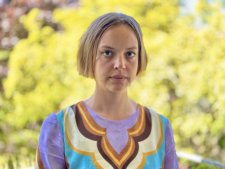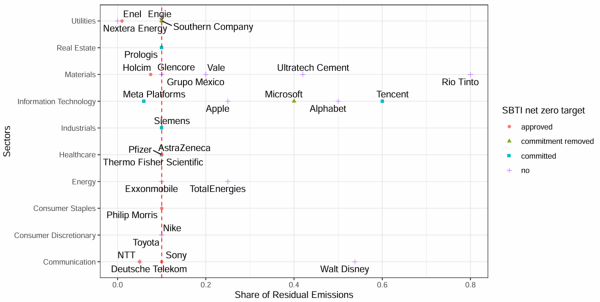In this STAR interview, we speak to Rosalie Arendt of the Faculty of Engineering Technology (ET). STAR is an acronym for (S)ituation, (T)asks, (A)ctions, (R)esults. We have many “star” colleagues at UT with interesting stories to tell. Rosalie Arendt aims to help shift the paradigm. By demonstrating how offsetting delays real emission reductions, I strive to provide society with the tools to curb greenwashing.


Situation
What is/was the situation (S) of your research/initiative?
When I began at the University of Twente in early 2023, I was tasked with developing a scientifically robust approach to carbon offsetting. It soon became clear that offsetting, for instance, by offering compensation for flights, raises more questions than it answers. It often masks structural problems, ranging from mitigation deterrence (postponing genuine emission cuts) to negative impacts on local communities in the Global South, as a recent documentary of the World Rainforest Movement shows. I recognise mitigation deterrence within our university: faculties routinely offset conference travel, even though many trips could have been avoided or replaced by conferences reachable by train. Consequently, my research does not aim to “optimise” offsetting but to expose its underlying dynamics, how it serves as a political instrument that sustains over-consumption of some and reproduces colonial power structures. This is also apparent in sectors like construction, where so-called "unavoidable" cement emissions often reflect luxury demand, endless new builds, while millions of square meters stand vacant or are dedicated to holiday or secondary homes.
Tasks
What tasks (T) were or are you currently working on?
My role has shifted from trying to make offsetting “work” to interrogating it at a fundamental level. I analyse how offsetting projects function in practice and in context. My first PhD student, Felice Diekel, critically investigates the intersection of water, biodiversity and carbon offsetting. She will soon begin a case study on a wetland restoration project in Northern Brandenburg, following the completion of her comparative scoping review on the intersection of carbon, biodiversity, and water offsetting. In November, a second PhD candidate, Yashi Punia, will join me and Felice. She will work on the NL2120 project, focusing on nature-based solutions in the Dutch context. They will also examine how nature-based solutions can deliver benefits and how they are institutionalised in national policy, while critically examining the risk of mitigation deterrence and assessing the colonial implications of framing such solutions as globally exportable fixes. In parallel, I investigate how companies and countries define unavoidable residual emissions and whose interests are served by branding emissions as “unavoidable”. Currently, I am focusing on this issue in the cement sector.
Regarding teaching, I teach courses on Life-Cycle Assessment, environmental accounting and market-based environmental policy. While I teach the fundamentals of environmental quantification, I try to transmit critical thinking skills to my students. When focusing on water quality trading, I try to make the students reflect on the limits of market-driven solutions and in Life Cycle Assessment, I underline how results can be manipulated through weighting schemes.
Beyond academia, I seek to shape policy by contributing to the stakeholder process of Article 6.4 of the Paris Agreement that regulates carbon credits under the Paris Agreement and by collaborating with networks such as the Dutch Climate Obstruction Network.
Actions
What actions (A) are you working on, and who is involved?
Currently, I am working on a paper on residual emissions in national cement-decarbonisation strategies, for which I am collaborating with researchers from various universities and the Potsdam Institute of Climate Impact Research's Future Lab on Social Metabolism, where I will go on a research visit this summer. My initial findings expose a systemic bias in decarbonization strategies: while technical solutions like carbon capture and storage (CCS) dominate policy discussions, demand-side sufficiency measures are routinely marginalised. Reducing overconsumption is sidelined in policy debates, framed as a matter of individual lifestyle rather than a societal imperative or actionable policy priority. This is very clear in relation to cement and construction, for example, in the lack of policies that address the underutilization of existing buildings, the rising floorspace per capita, as well as speculative construction.
Meanwhile, Felice is exploring the complexity of social-ecological systems in which offsetting practices are embedded, looking beyond their market benefits. Felice’s research is accompanied by a continuing interest in questions of positionality and the philosophy of science. In this context, she received support from the DEI Incentive Fund and is co-organising the Expanding Perspectives lecture series, which will take place from September 2nd to October 21st here at the UT.
Beyond academia, I am deeply committed to driving social-ecological transformation. As an engaged activist, I have participated in various movements advocating for systemic change. Currently, I am involved with WOinActie and the education union AOb, where I resist the ongoing dismantling of higher education, with particular focus on defending green and climate education and research from harmful budget cuts.
Results
What results (R) do you hope to achieve, and how will society (or UT organisation) perceive them?
Ultimately, I aim to help shift the paradigm. By demonstrating how offsetting delays real emission reductions, I aim to provide society with the tools to curb greenwashing. One tangible outcome, led by Felice, has been blocking a dangerous loophole in Article 6.4 negotiations. The proposed mechanism would have allowed infinite offsetting loops: water credits could 'compensate' for water degradation from carbon offsets, while water credits could then have carbon impacts that might be offsetable again, creating a circular accounting fiction.
Moreover, I train students to design ecologically responsible public infrastructure using life-cycle assessment (LCA) methods - equipping them to implement sustainable practices in government, NGOs, and engineering firms.
Finally, I hope to start a societal debate, clarifying when compensation is an acceptable last resort and when not pursuing a certain activity is the only defensible choice at the societal level. In my last journal article, I criticised how companies define and present high residual emissions as a foregone conclusion to avoid action and wrote a companion article in the Blätter für deutsche und internationale Politik to bring these critiques beyond academia. The goal is not to perfect offsetting but to render it unnecessary: a world in which emissions are prevented rather than covered up through projects that often do more harm than good.






